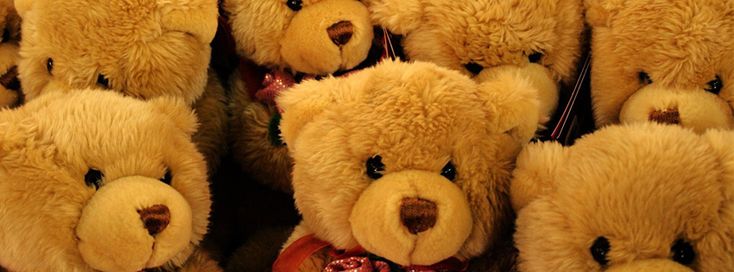blog
The Timeless Appeal of Teddy Bears: Why We Love Them
Teddy bears are one of the most beloved toys across the globe. Their soft, cuddly appearance and comforting embrace have made them a symbol of childhood, nostalgia, and comfort. From the smallest child’s nursery to adult collectors’ shelves, teddy bears hold a unique place in our hearts. Whether it’s their huggable nature, their connection to our emotions, or the memories they evoke, teddy bears have a timeless appeal that has stood the test of time. But what exactly is it about these stuffed animals that make them so universally adored? This article will explore the history, emotional connection, and lasting appeal of teddy bears, and why they continue to hold a special place in our hearts.
1. The Origins of the Teddy Bear
The story of the teddy bear begins in the early 20th century, when a simple toy became an iconic symbol of comfort and companionship. The invention of the teddy bear is closely tied to Theodore Roosevelt, the 26th President of the United States, whose nickname “Teddy” inspired the toy’s name. The tale begins in 1902 when President Roosevelt went on a hunting trip in Mississippi. After a long day of searching for game, Roosevelt refused to shoot a bear that had been captured and tied to a tree, deeming it an unfair chase. This compassionate act caught the attention of political cartoonist Clifford Berryman, who illustrated the incident. The cartoon was widely published, and a toy manufacturer named Morris Michtom was inspired to create a stuffed bear in honor of Roosevelt’s act.
Michtom’s creation became an instant hit, and soon, the “Teddy bear” was born. While the first teddy bears were simply made of plush and filled with sawdust or straw, they quickly gained popularity for their cuddly design and symbolic connection to comfort. As the years passed, teddy bears evolved in terms of materials, design, and functionality, but their charm remained the same.

2. The Emotional Connection to Teddy Bears
One of the key reasons why teddy bears are so beloved is the deep emotional connection people form with them. From a very young age, children tend to bond with their teddy bears, often considering them more than just toys. Teddy bears become confidantes, companions, and even protectors. Children may talk to their teddy bears, share secrets, and confide in them, especially when they feel scared, lonely, or sad. The softness and warmth of the bear provide a sense of security and comfort, making it an essential part of a child’s emotional development.
In addition to their comforting presence, teddy bears serve as a means of emotional expression. Many children carry their teddy bear with them to school, on trips, or even to the doctor’s office to alleviate anxiety. The teddy bear becomes a symbol of familiarity and safety in a world that can sometimes feel overwhelming.
This emotional attachment to teddy bears is not limited to childhood. Adults often retain fond memories of their childhood teddy bears, and for many, these memories are connected to feelings of warmth, love, and family. Some people continue to keep their teddy bears well into adulthood, preserving them as cherished keepsakes that remind them of their past.
3. Teddy Bears as Symbols of Comfort and Security
The teddy bear’s timeless appeal can largely be attributed to its symbolic role as a comfort object. Unlike other toys, a teddy bear is not just an inanimate object; it becomes a companion that offers solace during times of distress. The act of hugging a teddy bear has been shown to release oxytocin, the “feel-good” hormone that promotes feelings of warmth, affection, and bonding. This chemical response helps reduce stress and anxiety, making teddy bears effective tools for emotional regulation, both for children and adults.
For children, the teddy bear’s role as a source of comfort extends beyond the early years. Many children will reach for their teddy bear during moments of fear, such as when experiencing nightmares or feeling anxious in unfamiliar environments. The bear provides a sense of continuity and emotional stability. Research has shown that comfort objects like teddy bears can help children feel more confident and secure, which can positively impact their emotional well-being.
The significance of teddy bears extends beyond childhood. For adults, the emotional bond with a teddy bear can serve as a reminder of simpler, more innocent times. Many people keep their childhood teddy bears as cherished mementos, and some even collect teddy bears as a hobby. These adult collectors often view teddy bears as more than just toys—they are symbols of nostalgia and emotional connection. The act of holding or displaying a teddy bear can evoke memories of family, friendship, and love, creating a sense of comfort even in adulthood.
Additionally, teddy bears are often given as gifts during times of loss or hardship. Whether it’s to comfort a grieving friend, celebrate a new arrival, or celebrate a special occasion, teddy bears are seen as a token of love and compassion. Their presence offers emotional reassurance and a tangible expression of care. The idea that a teddy bear can be a source of comfort for people at all stages of life is what makes them timeless and universally adored.
4. The Enduring Popularity of Teddy Bears in Popular Culture
Beyond their role as comforting companions, teddy bears have become embedded in popular culture. They appear in countless movies, television shows, books, and advertisements, further solidifying their status as a beloved icon. The teddy bear’s image evokes a sense of innocence and purity, making it a popular symbol for everything from childhood memories to emotional support.
One of the most iconic teddy bear characters in popular culture is Winnie the Pooh. Created by A.A. Milne, Winnie the Pooh and his friends in the Hundred Acre Wood have been adored by generations of children and adults alike. Pooh’s loveable and somewhat clueless nature resonates with audiences, and his stories often center around themes of friendship, adventure, and comfort—attributes that are also central to the appeal of teddy bears.
Another famous teddy bear character is Paddington Bear, a British creation who has been featured in a series of books and films. Paddington, with his polite manners and love of marmalade, has become a cherished character for many, showing that teddy bears can transcend cultural boundaries and generations.
In addition to these beloved characters, teddy bears continue to make appearances in modern media, advertising campaigns, and merchandise. They are often used as symbols of warmth, love, and nostalgia in commercials, making them a powerful marketing tool. For example, brands in the children’s toy industry often use teddy bears in their advertising to evoke feelings of safety and happiness.
Teddy bears also play an important role in the world of charity and fundraising. Organizations around the world use teddy bear-themed campaigns to raise money for various causes, knowing that the comforting image of a teddy bear will inspire generosity and compassion. Whether it’s through charity auctions or the sale of teddy bear-themed products, these toys are used to support a wide range of humanitarian efforts.
Furthermore, teddy bear collecting has become a popular hobby for many adults. Collectors seek out limited-edition, vintage, and artist-designed teddy bears, some of which can fetch high prices in the marketplace. The craftsmanship and artistry involved in creating unique teddy bears add to their value, turning them into cherished collectibles that are passed down through generations.

5. Why We Love Teddy Bears
Teddy bears have a special place in our hearts because they represent so much more than just a stuffed animal. They symbolize comfort, safety, love, and connection. The appeal of teddy bears transcends age, culture, and time, which is why they have remained beloved for over a century. Whether they are comforting children, evoking nostalgic memories, or serving as collectible treasures, teddy bears continue to bring joy and warmth to people’s lives.
Their enduring popularity can be attributed to the emotional connections they help foster and the comforting role they play in our lives. They remind us of the importance of love, friendship, and emotional support. As symbols of reassurance and tenderness, teddy bears have earned their place as one of the most timeless and cherished toys in the world.
In conclusion, teddy bears remain a beloved part of childhood and adulthood alike because of their ability to provide comfort, companionship, and a sense of security. Their timeless appeal lies in their ability to evoke warmth, love, and nostalgia. No matter how old we get, the simple act of hugging a teddy bear can still make us feel safe, cared for, and loved—an enduring legacy that continues to captivate hearts around the world.

